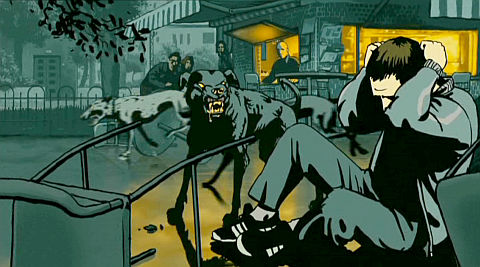

Of course, justice must be served against killers. That's not to take away responsibility for those who commit atrocities like the slaughter of unarmed, innocent Lebanese civilians by "Christian" forces loyal to the then-recently-assassinated Bashir Jumayel, President of Lebanon.

But on the ground level, where the fighting itself is taking place, there are only victims, regardless of who "wins" the conflict.

Yes, there are aggressors, mostly politicians who already enjoy power, goading on the common men and women who actually fight the wars. This is also true of the Lebanon conflict of the early '80s, which is the subject of this graphic novel. Profoundly original in form and approach, Waltz with Bashir will take its place as one of the great works of wartime testimony.Īs the current ('14) conflict rages on in Gaza, I am reminded that, in this war, there are only victims. The result is a gripping reconstruction, a probing inquiry into the unreliable quality of memory, and, above all, a powerful denunciation of the senselessness of all wars. The recollections accumulate until Ari Folman arrives at Sabra and Shatila and his investigation reaches its terrible end.

Tanks crush cars and buildings with lethal indifference snipers pick off men on donkeys, men in cars, men drinking coffee a soldier waltzes through a storm of bullets rock songs fill the air, and then yellow flares. Soldiers are haunted by inexplicable nightmares and flashbacks - snapping, growling dogs with teeth bared and eyes glowing orange a recurring image of three young men rising naked out of the sea to drift into the Beirut battlefield. Gradually, the blankness of his mind is filled in by scenes of combat and patrol, misery and carnage, as well as dreams and hallucinations. Then came a friend's disturbing dream, and with it Folman's need to excavate the truth of the war in Lebanon and answer the crucial question: what was he doing during the hours of slaughter?Ĭhallenging the collective amnesia of friends and fellow soldiers, Folman painfully, candidly pieces together the war and his place in it. Ari Folman was one of those Israeli soldiers, but for more than twenty years he remembered nothing of that night or of the weeks leading up to it. One night in Beirut in September 1982, while Israeli soldiers secured the area, Christian militia members entered the refugee camps of Sabra and Shatila and began to massacre hundreds, if not thousands, of Palestinians. "Special, strange, and peculiarly potent.


 0 kommentar(er)
0 kommentar(er)
